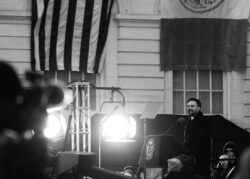As a 19-year-old Hindu Indian-American from the Bible Belt of the U.S. studying at a Jesuit university in an Islamic country, I’ve often taken it as my responsibility to answer for the actions of a variety of peoples. During my second year in Doha at the School of Foreign Service in Qatar, I find myself once again wedged between competing emotions from my competing cultural contexts; many of my Muslim friends are angry about an anti-Islamic video, while many of my American peers in the U.S. are enraged by the violent and vengeful acts of the “Muslims.” Both actions cannot be justified.
Just as the atrocities perpetrated by Islamic fundamentalists are not representative of the people of Islam, the bigoted behavior of deranged Americans is not representative of the entire U.S.
We as a nation have been responsible for evils in the past. Our government has done things that I will forever be ashamed of; from segregation to anti-Communist witch-hunts to armed missions against other countries, we have been far from perfect.
And we are still flawed in some ways; countries, much like people, make mistakes. It is difficult for me to come up with a response to those of this region who wish to protest the Iraq War, our actions in Afghanistan, or our generally apathetic attitude towards the plight of the Palestinian people.
But in this case, I must take a firm stand. Behind me in my room, there hangs an American flag, the same flag that is flown over the U.S. Capitol in Washington. I share a dorm with two other Americans, one of whom served in the armed forces. So every day, whether it’s through an intense game of Madden or a debate on presidential politics at home, I remember what it means to be an American, despite living in the heart of the Middle East.
Freedom of speech is a paramount right in my country. I will never say otherwise. But the provocative nature of Nakoula Basseley Nakoula’s film is criminal. If there is one thing we have struggled to learn as a people over the last 250 years, it is that the U.S. is—at least supposedly—welcoming of all peoples. While attitudes do not always stand where we want them to, the bulk of the nation is accepting. And we are slated to be as such.
So it is the job of that majority to condemn the actions of Nakoula, the epitome of un-Americanism; a convicted drug dealer who caustically set out to offend a passionate people.
At the same time, this condemnation must be reciprocated by my Muslim brothers and sisters. Do the actions of Nakoula justify the murders of several U.S. Foreign Service Officers in Libya? Absolutely not.
If it is my duty as an American to condemn the actions of Nakoula for his un-American cinematography, then is it not the duty of the people of this region to condemn those who are trying to destroy our embassies?
As a global citizen, I embrace protest against wrongful action. But harming innocent people is unwarranted. The actions of one individual are not representative of the nation, and definitely not representative of the State.
I am saddened by this. I am saddened that Nakoula is receiving attention for his juvenile, disrespectful film. Nakoula’s “work” should be dismissed—the focus should be on the deplorable acts being committed in the rest of the Middle East instead. As Syria crumbles in our midst, why should we pay this criminal any attention?
If we truly wanted to protest, even insult the creator of the film, we should not watch it. We should pay Nakoula no heed.
If Americans want to be Americans during this time, we should stand to condemn the provocative actions of this filmmaker.
After speaking with my Arab and Muslim friends about the events of the past few weeks, I’ve heard sentiments such as “Where does freedom of speech begin and end?” or “When one guy blows himself up, you guys blame the rest of us! Now you know how it feels.”
There’s a reason we say “God bless America” instead of “God bless Americans.” Americans are a people, an imperfect people. But we stand united to form one nation, a nation with one voice.
Nakoula is an American. He’s also an Egyptian and a Coptic Christian. Just as Osama bin Laden was never the voice of Islam, I do not think he is representative of American, Egyptian, or Coptic Christian sentiments. One thing’s for sure, he’s definitely not representative of mine.




